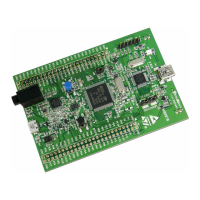DocID026304 Rev 3 37/44
AN4488 Reference design
43
8 Reference design
8.1 Description
The reference design shown in Figure 26, is based on the STM32F407IG(H6), a highly
integrated microcontroller running at 168 MHz, that combines the Cortex
®
-M4 32-bit RISC
CPU core with 1 Mbyte of embedded Flash memory and 192+4 Kbytes of SRAM including
64-Kbytes of CCM (core coupled memory) data RAM
.
This reference design is intended to work with a V
DD
from 1.8V minimum (PDR_ON =
VDD_MCU) and using embedded voltage regulator for 1.2V core supplies (BYPASS_REG =
GND), although BYPASS_REG = VDD_MCU is possible with JP1 jumper change, the
additional hardware as described in Section 2.3.6 is not present.
This reference design can be tailored to any other device listed in Table 1 with different
package, using the pins correspondence given in Table 12: Reference connection for all
packages.
8.1.1 Clock
Two clock sources are used for the microcontroller:
• LSE: X2– 32.768 kHz crystal for the embedded RTC
• HSE: X1– 25 MHz crystal for the STM32F4xxxx microcontroller
Refer to Section 4: Clocks on page 26.
8.1.2 Reset
The reset signal in Figure 26 is active low. The reset sources include:
• Reset button (B1)
• Debugging tools via the connector CN1
Refer to Section 2.3: Reset & power supply supervisor on page 10.
8.1.3 Boot mode
The boot option is configured by setting switches SW2 (Boot 0) and SW1 (Boot 1). Refer to
Section 5: Boot configuration on page 30.
Note: In low-power mode (more specially in Standby mode) the boot mode is mandatory to be
able to connect to tools (the device should boot from the SRAM).
8.1.4 SWJ interface
The reference design shows the connection between the STM32F4xxxx and a standard
JTAG connector. Refer to Section 6: Debug management on page 32.
Note: It is recommended to connect the reset pins so as to be able to reset the application from
the tools.
8.1.5 Power supply
Refer to Section 2: Power supplies on page 7.

